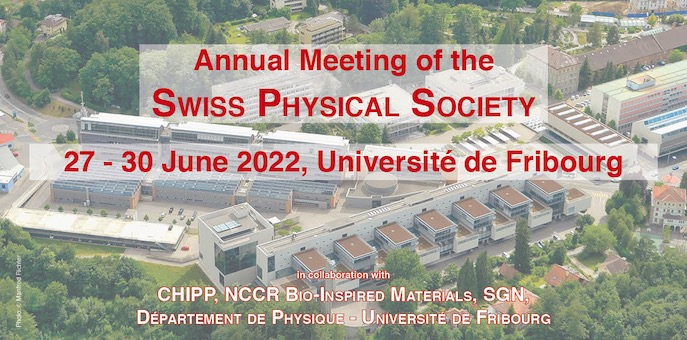Abstracts can be submitted for all sessions listed below. The choice between an oral or a poster presentation of your contribution is possible. Further instructions are available in the abstract submission form.
Info on talk lengths
The standard length for a contributed talk is 15 min (12+3), for an invited talk 30 min (25+5). The session organisers might extend or shorten talks where necessary. Refer to the schedule once it will be available.
Theoretical Physics
As in the previous years, theoretical contributions are highly encouraged and will be included directly in a corresponding topical session. This way, the sessions will profit from a broad range of experimental, phenomenological, and theoretical advancements that are relevant in the specific topical field and thus can engage in broader and deeper discussions.
Please submit your abstract to the session which best matches your topic. You can optionally mark your contribution as "theoretical" in the submission interface.
Contact: Philippe Jetzer (jetzer@physik.uzh.ch)
-
Applied Physics and Plasma Physics
-
Atomic Physics and Quantum Optics
-
Biologically inspired assembly of ordered and disordered optical materials
The brilliant colors found in plants, insects, birds, and mammals are the most exciting and appealing examples of how nature creates complex materials. Colored coatings and pigments play an important role in material science and applications in paints, displays, packing, and optical filters. The design targets for an industrial application are often like the challenges faced by nature: high purity of the color, optical density, bleaching stability, and long lifetime. Recently, disordered but structurally correlated materials, such as hyperuniform dielectric assemblies and networks, have led to a paradigm shift in the field. The session discusses and presents cutting-edge research that leverages nature's inspiration and aims to understand better and exploit ordered and disordered materials' optical physics and assembly.
Invited speakers are Prof. Diederik Wiersma, LENS, Univ. Florence, INRIM, Italy, and Dr. Ahmet Faik Demirörs, ETH Zürich. Contributed talks and posters are welcome.Contact: Frank Scheffold (frank.scheffold@unifr.ch), Guillermo Pedro Acuna (guillermo.acuna@unifr.ch), Ullrich Steiner (ullrich.steiner@unifr.ch)
-
Biophysics, Medical Physics and Soft Matter
-
Condensed Matter Physics (KOND)
The condensed matter program welcomes contributions from all topics within Condensed Matter Physics, including magnetism, superconductivity, semiconductors and more. Where relevant, we encourage participants to submit their abstracts to the respective focus sessions described on this page.
Contact: Henrik M. Rønnow (henrik.ronnow@epfl.ch), Ilaria Zardo (ilaria.zardo@unibas.ch)
-
History and Philosophy of Physics
-
New prospects in ARPES for quantum materials
Angle-resolved photoemission spectroscopy (ARPES) is one of the most powerful techniques to measure the momentum-resolved electronic structure of materials. In the recent years, the development of high brilliance synchrotron facilities, as well as stable laser technology, have allowed new possibilities like micro- and nano-ARPES, in-operando ARPES on tiny devices, as well as versatile time-resolved ARPES to cite a few of them.
This special session is dedicated to review the recent ARPES developments and highlight the most advanced achievements in systems ranging from quantum materials, correlated systems and complex devices. The session will bring together the ARPES research groups and serve to elaborate novel perspectives and collaborative development.Contact: Claude Monney (claude.monney@unifr.ch), Luc Patthey (luc.patthey@psi.ch), Felix Baumberger (felix.baumberger@unige.ch)
-
Nonequilibrium properties of quantum materials
The development of ultrafast laser techniques and pump-probe experiments has enabled studies of the nonequilibrium properties of materials on the intrinsic timescales of the charge, spin, orbital and lattice degrees of freedom. Such experiments allow to disentangle competing or cooperative effects along the time axis, and to access metastable states with novel properties. Also, on the theory side, this research field is currently very active with the development of theoretical concepts and computational techniques which enable a description of nonequilibrium phenomena in interacting lattice systems. The ultimate goal in the field is the control of material properties on ultrafast timescales, and the realization of new devices which exploit nonequilibrium states of matter.
This session will bring together experts from the experimental and theoretical sides to stimulate discussions and an exchange of recent insights and ideas. The invited speakers will provide an overview of recent achievements and emerging techniques, while the contributed talks will present recent activities of the respective research groups.Contact: Claude Monney (claude.monney@unifr.ch), Philipp Werner (philipp.werner@unifr.ch)
-
Nuclear, Particle- and Astrophysics (TASK)
-
Physics at work in Industry
Technology companies are often either driven by physicists or a physical effect or device lies at the heart of their main product. In this year’s Physics in Industry session, we want to bring together presentations from a broad range of companies that span the full width of this spectrum. We specifically also welcome presentations from companies where the role of physics or physicists is maybe not immediately obvious to the outside observer but has played an important role in the success or founding process of the company.
If you are interested in presenting a talk in this session please contact the section heads.Contact: Thilo Stöferle (tof@zurich.ibm.com), Andreas Fuhrer (afu@zurich.ibm.com)
-
Swiss Neutron Science on the European Scale
The Swiss spallation neutron source SINQ at Paul Scherrer Institute (PSI) is celebrating 25 years of user operation, and recently underwent a major upgrade program. PSI’s ultra-cold neutron (UCN) source remains the most-powerful UCN source. Together, they enable a growing number of leading experiments in fields ranging from particle physics to quantum matter science, to applied and functional materials. In addition, Switzerland, and the Swiss neutron science community are deeply engaged on the European neutron landscape with investments at the world-wide most powerful reactor-based neutron source at the Institute Laue Langevin (ILL) in Grenoble and the European Spallation Source (ESS) under construction in Lund, which will become Europe’s new flagship facility. The Swiss Neutron Science Society invites abstracts from the growing user-base of these facilities to share their research. Abstract submissions are welcome from all topics where neutron experiments have contributed, or may contribute in the future.
Contact: Fundamental Physics: Florian Piegsa (florian.piegsa@lhep.unibe.ch), Hard Condensed Matter and Quantum Materials: Daniel Mazzone (daniel.mazzone@psi.ch), Applied and Functional Materials: Markus Strobl (markus.strobl@psi.ch), General requests: Marc Janoschek (Marc.janoschek@psi.ch)
